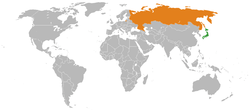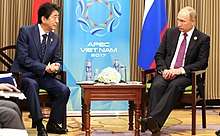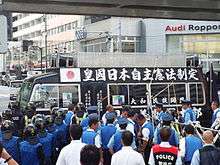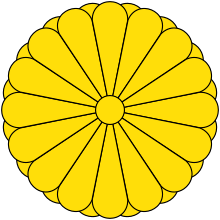Japan–Russia relations
 | |
Japan |
Russia |
|---|---|

Relations between Russia and Japan (Russian: Российско-японские отношения, Rossiysko-yaponskiye otnosheniya; Japanese: 日露関係史) are the continuation of the relationship of Japan with the Soviet Union from 1917 to 1991, and with the Russian Empire from 1855 to 1917. Historically, the two countries had cordial relations until a clash of territorial ambitions in the Manchuria region of northeastern China led to the Russo–Japanese War in 1904, ending in a Japanese victory which contributed to the weakening of the monarchy in Russia. Japan would later intervene in the Russian Civil War from 1918 until 1922, sending troops to the Russian Far East and Siberia. That was followed by border conflicts between the new Soviet Union and the Empire of Japan throughout the 1930s. The two countries signed a nonaggression pact in 1941, although the Soviet government declared war on Japan anyway in August 1945, invading of the Japanese puppet state of Manchukuo as well as seizing the chain of islands just north of Japan. The two countries have been unable to sign a peace treaty after World War II due to the Kuril Islands dispute.
As of December 2017 matters remain unresolved,[1] and these disputes have effectively soured relations between the two countries. According to a 2017 Pew Global Attitudes Project survey, 64% of Japanese people view Russia unfavorably, compared with 26% who viewed it favorably. People ages 50 and older are much less likely to hold a favorable view of Russia (16%) than those 18 to 29 (53%).[2] Nonetheless, the Japanese government sees Russia as an important partner for security and counterbalancing China and North Korea in the region. Because of this, since the start of the Ukrainian Crisis and the 2014 annexation of Crimea, Japan has continued to engage with Russia in spite of sanctions against the country by Japan's Western allies.[3] The governments of the two countries have taken efforts to increase relations, including Japanese investment in Russia,[4] military cooperation,[1] and organizing a year of cultural exchange between Russia and Japan for 2018.[5]
On 27 April, 2018 in Moscow was held the fourth Russia-Japan forum dubbed The Points of Convergence, where the sides discussed pressing issues concerning the two countries’ trade and economic relations. Toshihiro Nikai, the secretary general of Japan’s ruling Liberal Democratic Party, was the forum’s special guest, read out Japanese Prime Minister Shinzo Abe’s address at the event’s opening ceremony. Participants discussed the two countries’ tourism cooperation, investment projects for the Far East and other Russian regions, as well as interaction in the areas of infrastructure, technology and energy industry.
On June 23, 2018 Russia and Japan inked a memorandum of understanding (MOU) in Russia's Far Eastern Republic of Sakha (Yakutia) to expand cooperation between the two countries.[6]
History
Soviet and Tsarist era (1855–1991)
Early post-Soviet era (1991–2000)
The government of Boris Yeltsin took power in Russia in late 1991 upon the dissolution of the Soviet Union. At once, Moscow took a stand in opposition to relinquishing the disputed territories to Japan. Although Japan joined with the Group of Seven industrialized nations in contributing some technical and financial assistance to Russia, relations between Tokyo and Moscow remained poor. In September 1992, Russian president Boris Yeltsin postponed a scheduled visit to Japan. The visit took place on October 11, 1993. He made no further concessions on the Kuril Islands dispute over the four Kuril Islands (northeast of Hokkaido), a considerable obstacle to Japanese-Russian relations, but did agree to abide by the 1956 Soviet pledge to return two areas (Shikotan and the Habomai Islands) to Japan. Yeltsin also apologized repeatedly for Soviet mistreatment of Japanese prisoners of war after World War II. In March 1994, then Japanese minister of foreign affairs Hata Tsutomu visited Moscow and met with Russian minister of foreign affairs Andrei Kozyrev and other senior officials. The two sides agreed to seek a resolution over the persistent Kuril Islands dispute, but the decision of the dispute is not expected in the near future. Despite the territorial dispute, Hata offered some financial support to Russian market-oriented economic reforms. On July 30, 1998, the newly elected Japanese prime minister Keizō Obuchi had focused on major issues: signing a peace treaty with Russia, and renewing the Japanese economy. However, he died soon afterwards.
Current relations (2001–present)
In March 2014, following Russia's annexation of Crimea, Japan imposed several sanctions against Russia, which included halting consultations on easing the visa regulations between the two countries and suspension of talks on investment cooperation, joint space exploration and prevention of dangerous military activity.[7][8] In June 2018, Japan’s Princess Hisako Takamado travelled to Russia to cheer on her national team at the FIFA World Cup. She is the first member of the Imperial family to come to Russia since 1916.[9]
Kuril Islands dispute

.jpg)
On August 16, 2006, Russian maritime authorities killed a Japanese fisherman and captured a crab fishing boat in the waters around the disputed Kuril Islands. The Russian foreign ministry has claimed that the death was caused by a "stray bullet".[10]
On September 28, 2006, Russian Foreign Minister Sergei Lavrov said Russia would "continue the dialogue with the new Japanese government. We will build our relations, how the peoples of the two countries want them to be. Then-Foreign Minister Taro Aso remained on his post in the government. We have good, long-standing relations, we will act under the elaborated program."[11]
The dispute over the Southern Kuril Islands deteriorated Russo-Japan relations when the Japanese government published a new guideline for school textbooks on July 16, 2008 to teach Japanese children that their country has sovereignty over the Kuril Islands. The Russian public was generally outraged by the action and demanded the government to counteract. The Foreign Minister of Russia announced on July 18, 2008 "[these actions] contribute neither to the development of positive cooperation between the two countries, nor to the settlement of the dispute," and reaffirmed its sovereignty over the islands.[12][13]
In 2010, President of Russia Dmitry Medvedev became the first Russian president to take a state trip to the Kuril Islands. Medvedev shortly ordered significant reinforcements to the Russian defences on the Kuril Islands. Medvedev was replaced by Vladimir Putin in 2012.
In November 2013, Japan held its first ever diplomatic talks with the Russian Federation, and the first with Moscow since the year 1973.[14]
In September 2017, Prime Minister Shinzo Abe and Russian President Vladimir Putin met at Eastern Economic Forum, which held at Far Eastern Federal University in Vladivostok. The main purpose of meeting was approving joint economic activities on disputed islands off Hokkaido. In their talks the both leaders decided to sign off on joint projects in five areas — aquaculture, greenhouse farming, tourism, wind power and waste reduction.[15]
Military cooperation
The Russian Chief of General Staff, General Valery Gerasimov, visited Tokyo in mid-December 2017 to meet with his Japanese counterpart, Admiral Katsutoshi Kawano. He stated that there will be more than thirty joint military drills held by Russia and Japan in 2018.[1][3] Russia’s military chief, Gen. Valery Gerasimov, warned Defense Minister Itsunori Onodera in Tokyo that military exercises conducted by the United States around the Korean Peninsula will destabilize the region.Apparently with such exercises in mind, Gerasimov told Onodera at the outset of their talks, “Exercises in surrounding areas would increase tension and bring instability.” Onodera sought Russia’s cooperation in dealing with North Korea’s nuclear and missile provocations, saying Moscow has “big clout” with North Korea.
See also
References
- 1 2 3 Majumdar, Dave (12 December 2017). Could Russia and Japan Finally Settle Their Island Dispute?. The National Interest. Retrieved 15 December 2017.
- ↑ "Publics Worldwide Unfavorable Toward Putin, Russia". Pew Research Center. October 16, 2017.
- 1 2 Brown, James D. J. (11 December 2017). Japan woos Russia for its own security. Nikkei Asian Review. Retrieved 15 December 2017.
- ↑ Mochizuki, Takashi (2013-04-26). "Japan Seeks Closer Russia Ties - WSJ". Online.wsj.com. Retrieved 2016-10-22.
- ↑ Japan-Russia Year of Culture 2018 to feature grand exhibitions. TASS. Published 25 November 2017. Retrieved 15 December 2017.
- ↑ http://www.xinhuanet.com/english/2018-06/23/c_137275716.htm
- ↑ "TASS: Russia - Japan halts consultations on easing visa regime with Russia". En.itar-tass.com. Retrieved 2016-10-22.
- ↑ "Japan breaks several Ties with Russia over Crimea crisis". IANS. News.biharprabha.com. Retrieved 19 March 2014.
- ↑ https://www.rt.com/news/430192-japan-princess-russia-football/
- ↑ Justin McCurry. "Japanese fisherman killed in Kuril dispute | World news". The Guardian. Retrieved 2016-10-22.
- ↑ "Archived copy". Archived from the original on 2007-03-11. Retrieved 2006-09-29.
- ↑ "Russia hopes to solve territorial dispute with Japan by strengthening trust_English_Xinhua". News.xinhuanet.com. 2008-07-19. Retrieved 2016-10-22.
- ↑ Japanese schoolbooks to claim Russia's Southern Kuril Islands, RussiaToday, Accessed 2008-07-19
- ↑ "First diplomatic talks between Japan, Russia result in strengthened security cooperation". The Japan Daily Press. 2013-11-04. Retrieved 2016-10-22.
- ↑ https://www.japantimes.co.jp/news/2017/09/06/national/politics-diplomacy/abe-putin-likely-sign-off-economic-cooperation-disputed-isles/#.Wguc9Vu0PIU
- General

Further reading
- Allison, Graham, Hiroshi Kimura and Konstantin Sarkisov, eds. Beyond Cold War to Trilateral Cooperation in the Asia-Pacific Region: Scenarios for new relationships between Japan, Russia, and the United States (Harvard University Press, 1993)
- Brown, James D.J. "Japan’s foreign relations with Russia." in James D.J. Brown and Jeff Kingston, eds. Japan's Foreign Relations in Asia (2018): 248-61.
- Hara, Kimie. Japanese-Soviet/Russian Relations since 1945: A Difficult Peace (1998) online
External links
| Wikimedia Commons has media related to Relations of Japan and Russia. |
- Embassy of Japan in Moscow
- Consulate-General of Japan in Khabarovsk
- Consulate-General of Japan in Saint Petersburg
- Consulate-General of Japan in Vladivostok
- Consulate-General of Japan in Yuzhno-Sakhalinsk
- Embassy of the Russian Federation in Tokyo
- Consulate-General of the Russian Federation in Sapporo
- Database of Russian-Japanese relations

